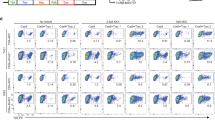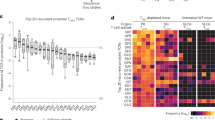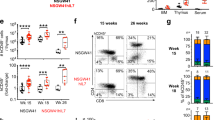Abstract
After the transfer of spleen cells from old CBA/T6T6 mice (greater than 75 weeks) into young syngeneic CBA/Ca recipients there usually follows a selective expansion of the donor T-cell population and the emergence of type B reticulum cell neoplasms (RCN-B), also of donor origin though probably derived not from the T-cells but from lymphoid dendritic accessory cells. As few as one million injected cells led to significant donor T-cell hyperplasia and tumour induction. Injection of cells from young donors did not have such consequences. Similar tumours were induced by transferring syngeneic cells in both C57BL and DBA/2 mice, although in the latter strain there was no requirement for the injected cells to derive from old donors. It appeared that T-cell proliferation was independent of donor accessory cells or RCN-B induction, since injection of enriched T-cells led to few tumours, although the T-cell chimaerism was indistinguishable from that in recipients of unseparated spleen cells. Development of tumours, however, seemed to be dependent upon stimulated T-cells. Recipients of spleen cells from old T-cell-deprived mice did not develop tumours; conversely, tumours, mostly of donor origin, were induced in recipients of young syngeneic cells when an extrinsic stimulus to T-cell proliferation was provided by continued allostimulation. The apparent selectivity of tumorigenesis for donor cells has led to the proposal that cellular relocation, as a result of transfer, may be an important predisposing factor in malignant transformation in circumstances of T-cell stimulation provided by antigenic challenge or by transfer of T-cells from old donors.
This is a preview of subscription content, access via your institution
Access options
Subscribe to this journal
Receive 24 print issues and online access
$259.00 per year
only $10.79 per issue
Buy this article
- Purchase on Springer Link
- Instant access to full article PDF
Prices may be subject to local taxes which are calculated during checkout
Similar content being viewed by others
Author information
Authors and Affiliations
Rights and permissions
About this article
Cite this article
Brittle, M., Wallis, V., Chaudhuri, M. et al. Induced type-B reticulum cell neoplasia in mice III. The importance of T-cell proliferation and cellular relocation in accessory cell transformation. Br J Cancer 57, 378–384 (1988). https://doi.org/10.1038/bjc.1988.86
Issue Date:
DOI: https://doi.org/10.1038/bjc.1988.86



